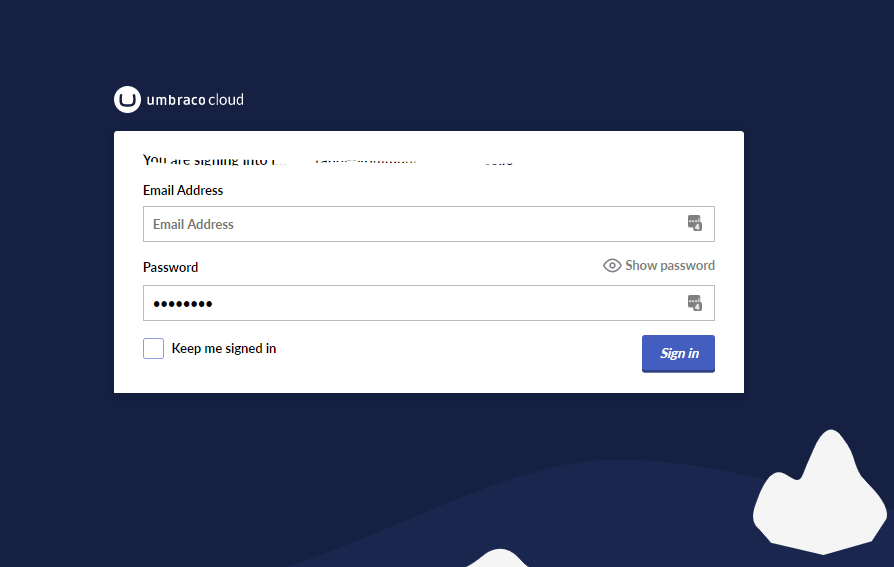My client's users are also unable to login. Not an AD integration, just a regular install. Back office users are redirected to the Umbraco Cloud login form, but if they don't have a cloud account they can't login to their own site?!
Is there any configuration options or documentation for this?
We need to go into each environment of the project via Kudu, so make sure you have Kudu access to all environments.
The objective is to remove the file named Umbraco.Cloud.Identity.Cms.dll from all environments, as well as committing the change to the git repository.
Be aware the following guide will be using Kudu direct, and git commands. Alternative - clone the environment down, remove the file, commit the change, and push.
go to `/site/wwwroot/bin
locate the assembly (make sure it is there) called Umbraco.Cloud.Identity.Cms.dll
delete the file, type rm Umbraco.Cloud.Identity.Cms.dll -
This will restart the site on the next request to it. (now we've removed the file from the webroot)
go to site/repository/bin
locate the assembly (make sure it is there) called Umbraco.Cloud.Identity.Cms.dll
delete the file, type git rm Umbraco.Cloud.Identity.Cms.dll - This will delete the file from disk and tell git it has been deleted
commit the deletion, type git commit -m "Remove the Umbraco Id integration"
repeat the above for all the environments in a project
Umbraco Id is now gone. By only removing the dll we ensure that Umbraco Id is no longer taking presence over your own LoginProvider, but we keep the configuration, so the site is ready, and configured when we figure out how to have multiple LoginProviders enabled on a site.
Umbraco Cloud single sign-on vs. AD Azure login
Anyone else has an issue with the new Single sign-on that has been rolled our last night on Umbraco cloud ?
Our clients with Azure AD login can't do taht anymore because of the new login interface ?
Any work around ?
Our client are locked out.. !
New Login
Old Login::
My client's users are also unable to login. Not an AD integration, just a regular install. Back office users are redirected to the Umbraco Cloud login form, but if they don't have a cloud account they can't login to their own site?!
Is there any configuration options or documentation for this?
Guide from Umbraco
We need to go into each environment of the project via Kudu, so make sure you have Kudu access to all environments. The objective is to remove the file named Umbraco.Cloud.Identity.Cms.dll from all environments, as well as committing the change to the git repository. Be aware the following guide will be using Kudu direct, and git commands. Alternative - clone the environment down, remove the file, commit the change, and push.
go to `/site/wwwroot/bin locate the assembly (make sure it is there) called Umbraco.Cloud.Identity.Cms.dll
delete the file, type rm Umbraco.Cloud.Identity.Cms.dll - This will restart the site on the next request to it. (now we've removed the file from the webroot)
go to site/repository/bin locate the assembly (make sure it is there) called Umbraco.Cloud.Identity.Cms.dll
delete the file, type git rm Umbraco.Cloud.Identity.Cms.dll - This will delete the file from disk and tell git it has been deleted
commit the deletion, type git commit -m "Remove the Umbraco Id integration"
repeat the above for all the environments in a project Umbraco Id is now gone. By only removing the dll we ensure that Umbraco Id is no longer taking presence over your own LoginProvider, but we keep the configuration, so the site is ready, and configured when we figure out how to have multiple LoginProviders enabled on a site.
is working on a reply...
This forum is in read-only mode while we transition to the new forum.
You can continue this topic on the new forum by tapping the "Continue discussion" link below.